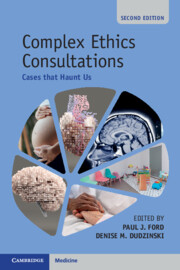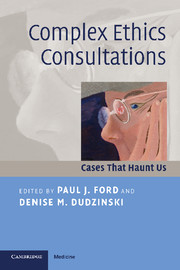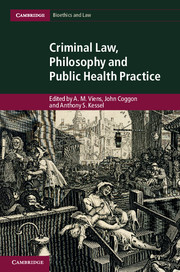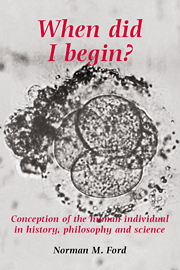Complex Ethics Consultations
Clinical ethics consultants navigate dilemmas across patient care, public health, and healthcare policy. Issues span from the beginning to the end of life, complex discharges, employment of novel technologies, and visitation restrictions. The second edition relays the narratives of fraught, complex consultations through richly detailed cases. Authors explore the ethical reasoning, professional issues, and emotional aspects of these impossibly difficult scenarios. Describing the affective aspects of ethics consultations, authors highlight the lasting effects of these cases on their practices. They candidly reflect on evolving professional practice as well as contemporary concerns and innovations while attending to equity and inclusivity. Featuring many new chapters, cases are grouped together by theme to aid teaching, discussion, and professional growth. The book is intended for clinicians, bioethicists, and ethics committee members with an interest in the choices made in real-life medical dilemmas as well as the emotional cost to those working to improve the situations.
- The standardized case format in each chapter is convenient for teaching in clinical and classroom settings (as a coursebook). The book also includes an Educational Overview/Curriculum for Ethics committees, bioethicists, students, and ethics consultants
- The focus on professional practice assists preparation for the Healthcare Ethics Consultation Certification Examination (HEC Certification)
- The narrative and reflective structure supports the resilience of clinicians in an era where burnout and moral distress are common
- Cases engage with growing concerns about moral distress, end-of-life dilemmas, justice and equity in healthcare ethics consultation to better prepare readers for the evolving practice of clinical and organizational ethics consultation in the healthcare setting
- This edition includes new authors to reflect on each section of the book attending attention to the evolution of the practice, justice, and equity
Reviews & endorsements
‘This rich anthology reminds us that clinical case consultation is a complicated process that is personal and intuitive, often haunting practitioners with memories that are both disturbing and instructive. Professors Ford and Dudzinski have brilliantly capitalized on the pedagogical value of these musings, editing a volume that will enrich teaching in the seminar room or at the bedside. This new edition places the current generation of practitioners into conversation with their pioneering predecessors from the first edition, reminding readers of the enduring values that should inform case consultation. This volume belongs in the library of every student and teacher of bioethics.’ Joseph J. Fins, M. D., D. Hum. Litt. (hc), M.A.C.P., F.R.C.P.; E. William Davis, Jr., M.D. Professor of Medical Ethics and Chief of the Division of Medical Ethics; Weill Cornell Medicine and Chair of the Hastings Center Board of Trustees; Author of Rights Come to Mind: Brain Injury, Ethics and the Struggle for Consciousness
'This volume provides a distinct and rare look at the inner workings of ethics consultation. The new edition probes more deeply yet, and a series of commentators revisits the original cases by posing questions or offering observations that invite greater reflexivity and deeper insights. The commentators are compassionate but unflinching, pushing the reader into deeper and more troubling waters than before. This is an invaluable resource for both the novice practitioner and the experienced ethicist, suitable for quiet introspection or lively classroom/boardroom discussion. It sparks the sort of intergenerational and cross-cultural conversations that our field now knows are long overdue.' Ann M. Heesters, Senior Director, Department of Clinical and Organizational Ethics, UHN Education Investigator II, TIER (The Institute for Education Research); Assistant Professor, Dalla Lana School of Public Health; Research Adjunct Professor, Michener Institute of Education; Wilson Centre Scholar; Member, Joint Centre for Bioethics, University of Toronto
Product details
June 2025Paperback
9781009400954
281 pages
234 × 156 × 15 mm
0.431kg
Available
Table of Contents
- Introduction: live and learn: courage, honesty, and vulnerability
- Part I. Starting at the Beginning: Prenatal and Neonatal Issues:
- 1. Quality of life – and of ethics consultation – in the NICU Robert C. Macauley and Robert R. Orr
- 2. When a baby dies in pain Thomas R. McCormick and David Woodrum
- 3. But how can we choose? Richard M. Zaner
- 4. Maternal-fetal surgery and the “profoundest questions in ethics” Mark J. Bliton
- Commentary 1. Reflections on Part I Lucia D. Wocial
- Part II. The Most Vulnerable of Us: Pediatrics:
- 5. She was the life of the party Douglas S. Diekema
- 6. The sound of chains Jeffrey Spike
- 7. Susie's voice Rosa Lynn Pinkus, Stella L. Smetanka, and Nathan A. Kottkamp
- 8. Access to an infant's family: lingering effects of not talking with parents D. Micah Hester
- Commentary 2. Reflections on Part II Nneka Sederstrom
- Part III. Diversity of Desires and Limits of Liberty: Psychiatric and Psychological Issues:
- 9. Helping staff help a “hateful” patient: The case of TJ Joy Skeel and Kristi Williams
- 10. Ulysses contract Barbara Daly and Cynthia Griggins
- 11. Misjudging needs Paul J. Ford
- 12. When the patient refuses to eat Debra Craig and Gerald R. Winslow
- Commentary 3. Reflections on Part III Maya Scott
- Part IV. Withholding Therapy with a Twist:
- 13. Listening to the husband Ellen W. Bernal
- 14. You're the ethicist
- I'm just the surgeon Joseph P. DeMarco and Paul J. Ford
- 15. Haunted by a good outcome: the case of Sister Jane George J. Agich
- 16. Is a broken jaw a terminal condition Stuart G. Finder
- Commentary 4. Reflections on Part IV Crystal Brown
- Part V. The Unspeakable/Unassailable: Religious and Cultural Beliefs:
- 17. Adolescent pregnancy, confidentiality, and culture Donald Brunquell
- 18. 'Tanya, the one with Jonathan's kidney': a living unrelated donor case of church associates Tarris D. Rosell
- 19. Futility, Islam, and death Kathryn L. Weise
- 20. Suffering as God's will Kathrin Ohnsorge and Paul J. Ford
- Commentary 5: Reflections on Part V: The Unspeakable/ Unassailable: Religious and Cultural Beliefs Mahwish Ahmad
- Part VI. Human Guinea Pigs and Miracles: Clinical Innovations and Unorthodox Treatment:
- 21. Amputate my arm, please. I don't want it anymore Denise M. Dudzinski
- 22. Feuding surrogates, herbal therapies, and a dying patient Alissa Hurwitz Swota
- 23. One way out: destination therapy by default Alice Chang and Denise M. Dudzinski
- 24. Altruistic organ donation: Credible? Acceptable? Ronald B. Miller
- Commentary 6: Reflections on Part VI: Human Guinea Pigs and Miracles: Clinical Innovations and Unorthodox Treatment Kaarkuzhali B. Krishnamurthy
- Part VII. The Big Picture: Organizational Issues:
- 25. It's not my responsibility Mary Beth Foglia and Robert A. Pearlman
- 26. Intra-operative exposure to sporadic Creutzfeldt-Jakob disease: to disclose or not to disclose Joel Potash
- 27. Why do we have to discharge this patient? Sarah E. Shannon
- 28. Who's that sleeping in my bed? An institutional response to an organizational ethics problem Daryl Pullman, Rick Singleton, and Janet Templeton
- Commentary 7: Reflections on Part VII Ruchika Mishra
- Conclusions, educational activities, and references Denise M. Dudzinski and Paul J. Ford
- Index.







